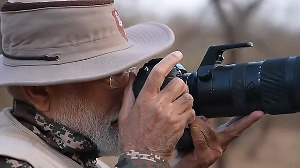 The train was pulling into the station. It had not even stopped when people started jumping in. Even before the train came to a complete halt, there was no place to sit in the first class. Business as usual.
The train was pulling into the station. It had not even stopped when people started jumping in. Even before the train came to a complete halt, there was no place to sit in the first class. Business as usual.
Exactly a year ago, one of the seven bombs that killed 187 people ripped through one of the first class compartments of this very train at Matunga in north-central Mumbai.
There were reminders of that Terror Tuesday: At Churchgate station, policemen were in full strength. Bags and suitcases were being checked at random. The policemen were taking down the names of all people carrying large bags.
The passengers were cooperating without complaint, though the metal detector door frame was not being used -- people were simply walking around it.
The train pulled out dot on time, perhaps symbolic of the fact that Mumbai stops for no one.
People continued to get in as the stations whizzed past --- Marine Lines, Charni Road, Grant Road. From Bombay Central, the train became a 'fast' train, which stops only at the bigger stations.
Regulars - who were well aware that this was one of the ill-fated trains last year -- said the usual crowd was missing as it was the anniversary of the blasts.
Yeshwant Aswekar, who works with the Western Railway, has been travelling on these trains for the last 17 years.
"5.57 is my normal train," he said. "It is convenient for me. Last year I missed it as I was a bit late and it had become too crowded to get in. After the blasts, we were nervous for the first 15 days. Any overhead luggage looked scary. Even today there is fear in the air -- many people did not come to work. The crowd is less."
Girish Vinchhi, 55, has been travelling on the Western Railway since he was a student at Chinai college in suburban Andheri. Now he lives in Dahisar -- a distant suburb -- and works near the Masjid Bunder station in south Mumbai.
Last year on this day, he had gone to buy his monthly railway pass. He had to stand in queue and was delayed by 10 minutes; 10 minutes that saved his life.
By the time he arrived at the platform with his pass, the trains had stopped running.
"There were no announcements that such a thing had happened," Vinchi recalled.
His son came on a motorcycle from Dahisar and took him home. He reached home at 2.15 am.
The next day, he was forced to stay at home. His asthma was acting up, thanks to hypertension.
But the day after, he was back on the train. "There is no alternative, we have to work," he sighed. "I am not scared."
One of his relatives was not as lucky. The blasts turned him deaf. He underwent treatment at the Bhagwati Hospital for a long time.
Zachary D'Souza, a Central Railway employee, works at the Chhatrapati Shivaji Terminus - previously Victoria Terminus -- and lives at Nalla Sopara on the outskirts of Mumbai. He has been traveling on the Western Railway for the past five years.
"Last year we were stuck in Dadar on the day of the blasts," said D'Souza. He and three of his friends took the 6.36 Virar slow from Dadar.
"We were behind the train that exploded at Matunga," he said. They went home by bus. They reached home at 4.30 am the next day.
"We are not scared, we are bindaas," he grinned, using the typically Mumbai word for carefree. "Today many people reminded us of the blasts; but it's not scary anymore."
Rohit Rathod, an employee of the State Bank of Saurashtra, has been a commuter on local trains for the last 12 years.
"Last year on this day I was in the 5.37 local," he said. "The blast occurred when we were entering Borivali. I was in the second class even though I have a first class pass. My colleague - who is from Nalla Sopara -- was travelling with me. He has a second class pass. I wanted to chat with him. That saved my life."
While Rathod was talking to us, a man handed him a plastic bag, requesting him to put it on the overhead luggage rack. Rathod obliged without even looking at the man or the bag.
He had certainly forgotten that last year, the police believe, the bombs had been placed on luggage racks by people who had then got off the trains.
Lucas Ogul, who is taking a compter course in Mumbai, is from Nigeria. He travels on the local train when he visits his friend in Mira Road. He has been travelling by local trains for three months now.
"I heard there was a bomb blasts on the trains last year. I know today is its anniversary," he said.
"Man, you must understand that the point is that people should feel comfortable," he added. "You must not keep reminding them about the blasts."
Lucas advised us not to go around asking people about bombs. People want to get on with their lives, he said.
Yes, life goes on. Mumbai has buried its dead.
Text: A Ganesh Nadar | Photograph: Uday Kuckian
5:19 pm | 5.26 pm | 5.37 pm | 5.48 pm | 5.50 pm | 5.54 pm | 5.57 pm






 © 2025
© 2025